|
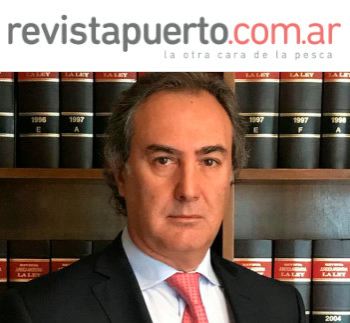
Eduardo Boiero, President of the Chamber of Shipowners of Fishing Vessels and Freezers of Argentina (CAPeCA). Image: Puerto Magazine / FIS
'This Olympic race on shrimp is not good for anyone'
 ARGENTINA
ARGENTINA
Friday, January 27, 2023, 07:50 (GMT + 9)
Eduardo Boiero is the president of CAPeCA, the chamber that brings together most of the historical pole boats that developed the fishery. In this interview he talks about the shrimp quota, not only as a legal debt of the administration but as a way of ordering, providing predictability and avoiding unfair situations.
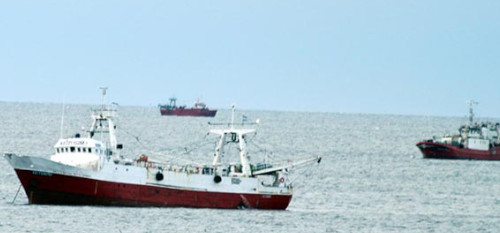
Photo: Revista Puerto
Once it has become clear that shrimp quotification is not only possible from a biological point of view, but is also considered a very beneficial tool to manage the fishery, the opinion of the main players in the sector begins to shape a necessary debate. The first to speak is Eduardo Boiero, president of CAPeCA. The pole trawlers in his camera are the ones that started the fishery, the ones that have a shrimp permit and an undisputed history of catches that leaves them in the best conditions before a possible quota. He knows that it will not be easy to come to an agreement with the new players that have entered the fishery, but he believes that the time has come to take the step because the Federal Fishing Law orders it and because the resource requires it to abandon the fishery once and for all. Olympic fishing in the main resource of the Argentine fishing industry.
PUERTO MAGAZINE: Should shrimp be quoted?
EDUARDO BOIERO: Yes, it is what is legally required. The Federal Fishing Law came to change the Olympic fishing regime that had governed up to that moment, by a quota or capture allocation regime, which are those provided for in the law; it does not necessarily have to be like the hake that was with a percentage of TAC (maximum permissible catch). What the law rewarded was the history of the permit holders for the assignments; both in employed personnel and in production and historical catches in relation to that species.
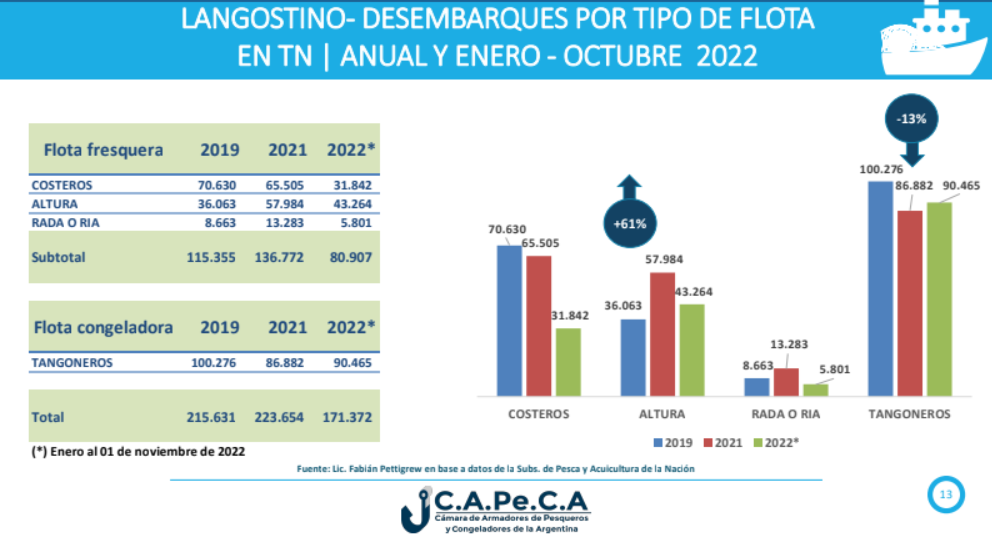
RP: What method do you think should be applied to shrimp?
EB: I think that the quota regime is a better system to manage the resource, both for the administration and for the administered. If one sees how the hake system is working beyond some exceptions that are under discussion, in general it works very well; It gives predictability, companies can be managed much better, these races to fish for everything would surely be avoided as soon as possible. In recent years the season has been shortened a lot and this has generated a race to fish as quickly as possible and this has had unintended consequences with behaviors that were questioned. From the two points of view, from the administration of the resource and from the legal one, it is what corresponds and what should be done.
RP: What is the current situation?
EB: For those administered, a situation of inequality is generated because the permit holder who had a history of hake was recognized and the permit holder who had a history of shrimp was not, quite the opposite. In recent years, this permit holder, who has a history of shrimping for many years, has lost participation in the fishery and has even lost heritage value, because a lot of boats have joined and the boats that have joined are not always the product of unrestricted permissions. A whole situation has been generated from 2014 onwards of increased fishing effort, not always matched by a pre-existing right.
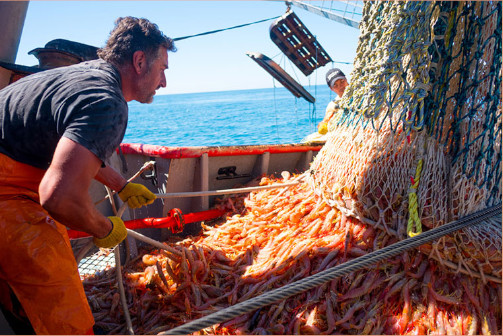
Photo: Revista Puerto
RP: Are you talking about permit reformulations?
EB: Yes, basically from the reformulation scheme that does not have regulations on how they should be done. Yes, there is a criterion of the Federal Fisheries Council that indicates that they have to reduce the fishing effort, but it has not been fulfilled either. In the case of shrimp, it is clear that the fishing effort in the fishery has increased as a result of these reformulations. In the absence of a standard, the criterion changes according to the composition of the Council, the application authority, the government, etc. So, even among the reformulations, unequal situations are generated, where a scheme is applied to one administrator and another is later not approved of that same scheme or is denied the right that was granted to another, and I do not think that this is good.
RP: In the shrimp, from the point of view of permits, is it in a system where anything goes?
EB: What is happening today is that we have a scheme that is not the one prior to the law and it is not the quota system after the law either. It is not being governed by the system prior to the law that was for unrestricted or shrimp permits that was in force until 1987 and which suspended the issuance of new hake and shrimp permits from that year. All this changed from the reformulations that were generating new permits and not always from unrestricted permits, the issue of non-quota species for example. This creates a situation of uncertainty for those administered in which it is not known what is required to have a shrimp permit. It is a hybrid system and not always fair.
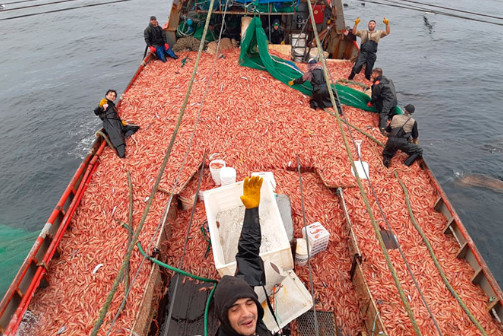
Photo: Revista Puerto
RP: It is difficult to imagine how the situation of the new permits that have been generated since 2014 will be ordered.
EB: One of the advantages of the quota is that it brings a bit of order in this sense, because having to establish the history of each permit, as was done with hake, based on the history of taking the legal catches of prawn, that allows to order it in some way. The quota, as ordered by the hake fishery, should order the shrimp fishery and no one should feel affected because it is the current legislation, it is what corresponds by law. Anyone who brought a boat to fish for shrimp, but does not have a permit that enables it, has to know it, they do not have to feel affected by this situation, we all know the law and we must abide by it, otherwise everything is worth it.
RP: It is probable that the fresh sector of Mar del Plata and some freezers also in this city oppose the quota precisely because they have no history or a permit that enables them to fish for shrimp. Are they the ones who are stopping the quota or is there no political decision?
EB: Interests are at stake, I understand that whoever brought a new boat and does not have a permit that covers all their needs is in a complicated situation, therefore, they are going to exert all possible pressure to continue to be recognized as a catch you need. It will not be easy and we will have to be flexible in order to find a balance in which everyone loses a little and not that there is only one loser and one winner, we will have to find a way around it. The freezer fleet went from having a participation of 70% in the fishery to having a participation of 50%, I am aware that they are not going to recognize 70% of the historical catch, but we do want the freezer fleet to be recognized at least 50% of their participation and then we will look for the return so that there are no big losers. The idea is that we all have a quota that allows us to work calmly and function a little more orderly.
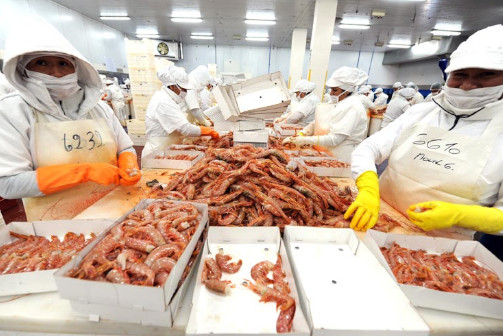
Photo: CAPeCA
RP: Is it possible that the workforce on land is a factor of pressure to balance the scales towards those who do not have a shrimp permit or a history of capture, as happened with hubbsi hake?
EB: For administrators, work on land has a very important weight and conditions them, because in general they see the generation of labor on land as more positive than on board, especially in the southern provinces, but the law also provides pondering labor, it will be a matter of working and finding a scheme, it is not easy but there was also no political will to face this process that is going to lead to certain disputes between companies and possibly between provinces. In any case, today most of the freezers have a plant on land, because the companies have diversified, today they weigh more than the fresh food fleet because most of them do not have their own plants.
RP: Is there any possibility that quota payments will be dealt with in the short term?
EB: The process must be installed because this Olympic race that is being generated on the resource is not good for anyone, neither for the administration nor for the resources, nor for the companies themselves. The pole fishing companies that have been in the activity for years and that are the ones that generate the most foreign currency with the same amount of tons, fish less every day, less time and consequently fewer tons. Today the freezers fish less than in 2001 and boats that have no history fish much more than a historical beam boat, creating an unfair situation and contrary to what the law pursues.
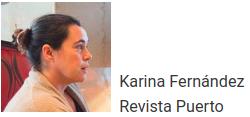
Noticia relacionada:
editorial@seafood.media
www.seafood.media
|



